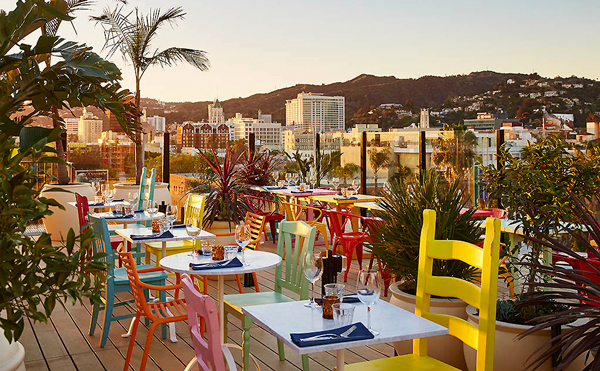Ultra-hip, luxury lifestyle hotels in Los Angeles are battling it out for market share in a city where rooms can easily go for $700 a night. And there’s a new player that’s looking to snatch a piece of that action.
AccorHotels is reportedly in exclusive negotiations to pay $125 million for half of locally-headquartered SBE Hotel Group’s common equity, owned in part by Cain International. Accor plans to invest another $194 million to acquire preferred equity owned by Cain and Yucaipa Companies, bringing its total investment to $319 million.
While that dollar amount may seem large, “that’s not so big by hotel standards,” said Daniel Levine, director of The Avant-Guide Institute, a trends consultancy that advises the hospitality industry.
Nightclub mogul Sam Nazarian is the founder and majority owner of SBE, which will operate 25 hotels by the end of 2018 — most located in North America. Locally, it owns the Mondrian LA in West Hollywood. Nazarian would continue to own the other 50 percent of SBE.
What AccorHotels — which owns venerable brands such as The Fairmont, Banyan Tree and swissotel — gets from the deal is simple, according to observers. “They are buying cool,” said Levine.
AccorHotels also owns Mama Shelter, another lifestyle brand that staked out territory in L.A. In 2015, the company opened Mama Los Angeles on Selma Avenue, designed by Thierry Gaugain.
The deal on the table with SBE is one of a number of developments in the L.A. market that are keeping RevPAR (revenue per available room) high and should continue to do so in the near future, experts said.
RevPAR for the Los Angeles-Long Beach area will hit $156.80 by 2020, up from a current $145.70, according to estimates by the HVS Hotel Valuation Index.
Downtown development is part of what’s driving up rates. Tapping into the never-ending thirst for hipness is The Downtown LA Proper Hotel, which is slated to open at the end of 2018 in the former Case Hotel space at Broadway and 11th Street.

Mama Shelter
Proper Hotels, which operates another location in Santa Monica, was launched by CEO Brad Korzen, founder and former CEO of Viceroy Brands. Proper attempts to “bridge the luxury mindset of a brand like Viceroy Hotels with the quixotic underground spirit of ones like Ace Hotels or 21c Hotels,” according to the brand’s site.
Meanwhile, existing hotels are filling up. “The occupancy downtown is very strong, and the beaches are very strong in terms of the room market throughout the year,” said Todd Wynne, executive vice president of global acquisitions and development for hotel management firm Two Roads Hospitality.
Two Roads’ portfolio includes the Tommie brand, which is slated to open a 200-room hotel in Hollywood by the end of the year within walking distance of the Hollywood Highland Entertainment Center. The firm will also be opening The Thompson Hollywood, which will have 197 rooms, by year’s end.
Despite the incoming inventory — and the existing presence of boutique hotels including Ace Hotel Downtown Los Angeles, The NoMad Hotel in Downtown Los Angeles, Freehand Los Angeles and Hotel Figueroa — insiders say the L.A. market for hip hotels is not saturated.
Wynne said there was “still more room for supply in other parts of Los Angeles” but said that Downtown Los Angeles, in particular, has room for growth because of better public transportation, offering easy access to new bars and restaurants.
“You can now take the subway up to Hollywood and to Santa Monica and move around the city a little easier than you used to,” he said. “That allows people to stay downtown and visit the beaches.”
Hoteliers are particularly excited about the Arts District. Grupo Habita, a trendy hotel chain based in Mexico City, has gotten approval to develop a 66-room boutique hotel in a former industrial space on Alameda Street, on the border of Skid Row.
Grupo Habita plans to jump on the micro-unit trend, offering tinier-than-usual rooms in addition to large common areas, a restaurant, pool and retail space.
“It’s a luxury product but the price point is a bit lower,” Levine says.
But not everything is going swimmingly. The much-awaited Soho Warehouse, originally slated to open a location downtown in 2016, has seen repeated delays. When it does open, it will be the latest outpost of the chi-chi Soho House brand — a members club with locations in West Hollywood and Malibu — to come to Los Angeles. Company representatives said that the 110,000-square-foot building will be the largest “standalone House” in the collection.
With acquisition prices remaining high, hoteliers need deep pockets to gain an edge, insiders said.
“Los Angeles is one of the four or five most sought after cities for hotel properties,” says real estate attorney Benjamin Tschann, a partner in Goodwin Procter’s real estate group. “The challenge is finding something on the market at a price that works.”
High labor costs are another challenge. “For a lot of hotel owners and operators, that is viewed as a potential risk to the success of their properties,” said Tschann. The minimum wage in the city is $13.25 an hour.
Unite Here, a union for hotel workers, is strong in the city, he said, adding that in terms of union presence, “New York is still probably the strongest but Los Angeles and San Francisco are not far behind.”
